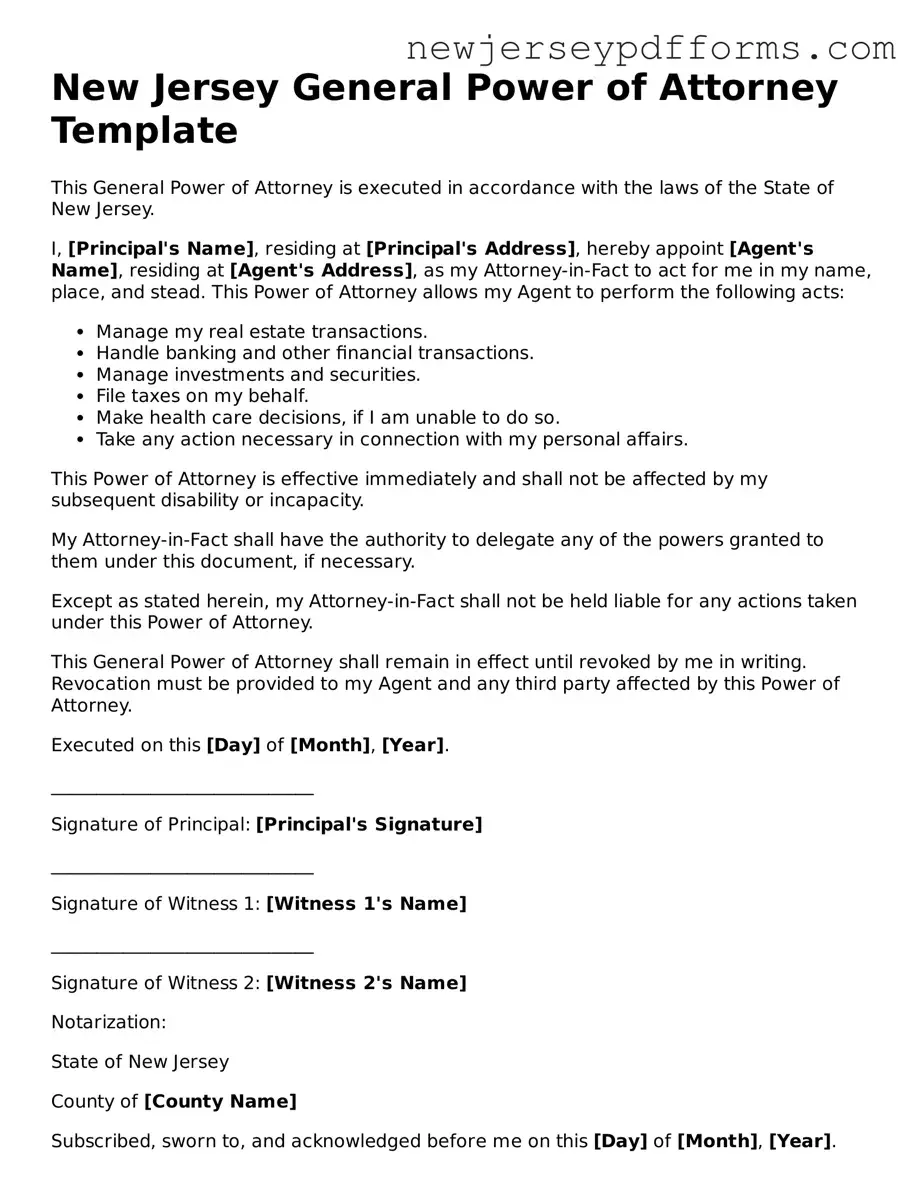What is a General Power of Attorney in New Jersey?
A General Power of Attorney (POA) is a legal document that allows one person, known as the principal, to grant another person, called the agent or attorney-in-fact, the authority to make decisions and act on their behalf. This can include managing finances, handling real estate transactions, and making legal decisions. In New Jersey, this document is especially useful when the principal is unable to manage their affairs due to absence or incapacity.
What powers can be granted through a General Power of Attorney?
The powers granted can vary based on the principal’s preferences. Generally, a General Power of Attorney allows the agent to handle financial matters, including banking transactions, paying bills, filing taxes, and managing investments. It can also include authority over real estate transactions, business operations, and legal matters. However, the principal can specify which powers to include or exclude in the document.
Does a General Power of Attorney need to be notarized in New Jersey?
Yes, in New Jersey, a General Power of Attorney must be signed in the presence of a notary public to be legally binding. This notarization helps verify the identity of the principal and ensures that the document is executed properly. Additionally, having witnesses can provide further validation, although it is not a requirement.
Can I revoke a General Power of Attorney in New Jersey?
Absolutely. The principal can revoke a General Power of Attorney at any time, as long as they are mentally competent. To do this, the principal should create a written revocation notice and provide copies to the agent and any relevant third parties, such as banks or healthcare providers. This ensures that everyone is aware of the change and prevents any confusion.
What happens if the principal becomes incapacitated?
Once the principal becomes incapacitated, the General Power of Attorney remains effective unless it was specifically stated to terminate upon incapacity. This means the agent can continue to act on the principal’s behalf. However, if the principal wishes to ensure that a different document, such as a Durable Power of Attorney, is in place, they should create that before any incapacity occurs.
Can I use a General Power of Attorney for healthcare decisions?
No, a General Power of Attorney is primarily for financial and legal matters. For healthcare decisions, a separate document known as an Advance Healthcare Directive or Medical Power of Attorney should be created. This document allows an agent to make medical decisions on behalf of the principal if they are unable to do so themselves.
Is there a specific form I need to use for a General Power of Attorney in New Jersey?
While New Jersey does not require a specific form, it is advisable to use a template that complies with state laws to ensure all necessary provisions are included. Many resources are available online, or you may choose to consult a legal professional to create a customized document that meets your needs.
Can the agent be held liable for their actions under a General Power of Attorney?
Generally, the agent is not personally liable for actions taken in good faith while acting under the authority of the General Power of Attorney. However, if the agent acts outside the authority granted or engages in misconduct, they may be held accountable. It is essential for the agent to act in the best interest of the principal and maintain transparency.
How long does a General Power of Attorney remain valid?
A General Power of Attorney remains valid until the principal revokes it, the principal passes away, or the document specifies a termination date. If the principal becomes incapacitated, the validity depends on whether the document was designed to remain effective in such situations.
What should I consider before creating a General Power of Attorney?
Before creating a General Power of Attorney, consider the level of trust you have in the person you choose as your agent. It's crucial to select someone responsible and capable of making decisions in your best interest. Additionally, think about the specific powers you want to grant and whether a General Power of Attorney is the right choice for your situation, especially in relation to healthcare decisions.

